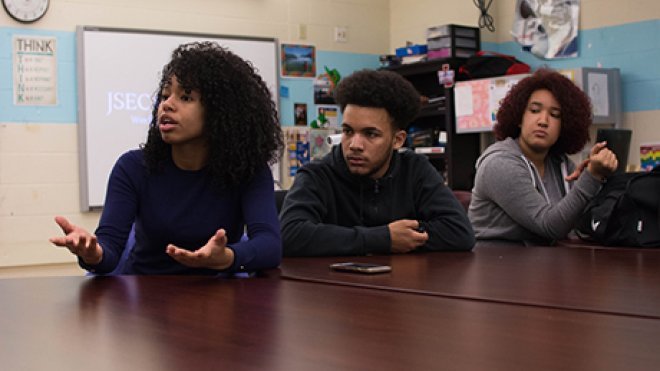Students in RWU SCS Community Development Program Take on Projects to Improve Real Communities
Rhode Island’s only community development program prepares students to address the challenges in urban and rural neighborhoods and communities

PROVIDENCE, R.I. – Solutions to community problems are rarely found in the pages of textbooks. They’re found in real communities by people who understand its issues, speak to its members and work with its leaders.
That is the philosophy of the community development program at the Roger Williams University School of Continuing Studies where students find themselves not just working in textbooks but taking on real projects as part of their coursework.
This approach gives them the skills to address challenges in today’s urban and rural neighborhoods, and allow them to make an impact while they are still students. This community experience prepares students for careers in building sustainable communities, said Taino Palermo, the program’s director.
“The best way to learn about how to positively create sustainable economic and community change is within the communities themselves with the leaders and change agents at the forefront of the work," Palermo said. "Fortunate for us, as the only community development program in the state, some of those same field practitioners are also adjunct faculty who can deliver course content through traditional academic teaching methods, as well as immersive experiential methods."
In recent years, the program and individual students have taken on a number of community-based projects. They’ve worked with schools, state officials, neighborhood organizations; they’ve set up food pantries, improved communications at state offices, and helped determined how to best meet a community’s needs.
“The whole concept is working with communities,” said Christine Smith ‘18. "That’s what we're doing” when we work with and get involved in real community-based projects, she said.
With these kinds of experiences, students say they’ll be able to hit the ground running when they start careers in community development or related fields:
A Food Pantry in the South Side of Providence
Dual-enrolled high school students at SCS taking a class on nonprofit management were challenged to identify a striking problem in their community. Quickly, they identified student hunger on the weekend as an issue. Their response? Start and operate a weekend food pantry as part of their course.
Students researched laws, drafted mission and vision statements, debated recruitment strategies around boardroom style tables and found partners like Sodexo and Whole Foods to donate food for the pantry.
In the end, each decision they made – using lessons from course materials – led to the successful launch of JSEC Goods, a registered 501(c)(3).
Improving Communication within Central Falls City Government
In Central Falls, three graduate certificate students in an organizational leadership course worked with the Central Falls City Council and Mayor's Office to improve communications between the two offices, and make the council more accessible to residents.
First, students set out to understand the problem. They met with officials to learn about existing communication flaws and what they hope can be fixed. From there, the students – Gregory Ehlinger '18, Lisa Gallant '19 and Jessica Vega '19 – set out to create a case study to present to the council and mayor’s office on how they can improve.
Every Sunday, the students met at a coffee shop to go over the work they did during the week and set work for the coming week. The students researched existing models and studied the methods and strategies that made them successful to see what can be applied in Central Falls.
They then came back to the council and presented their findings and suggestions. The council has already implemented some of their suggestions, such as improving their online presence on the city’s website and using social media to engage residents in public meetings.
Assessing the Needs of a Neighborhood
Over the years, the Mount Hope Neighborhood Association (MHNA) has struggled with transitions in leadership, board membership, reductions in assets and funding. The organization needed to conduct a study to see if there was still a need for it in the community and what those needs were. To lead this, it turned to the School of Continuing Studies.
Christine Smith and Gregory Ehlinger, students in the graduate certificate program, took on this project in a public policy and program evaluation course. They surveyed the Mount Hope Neighborhood in Providence to help determine the most effective role MHNA could play for residents in the neighborhood. Smith and Ehlinger worked with the Mount Hope board to construct the questions, went door-to-door with volunteers in 90-degree heat to conduct it, and then broke down the over 150 responses gathered (33 percent of the target area). They presented their findings to Mount Hope, which has been working to implement changes based on the survey.